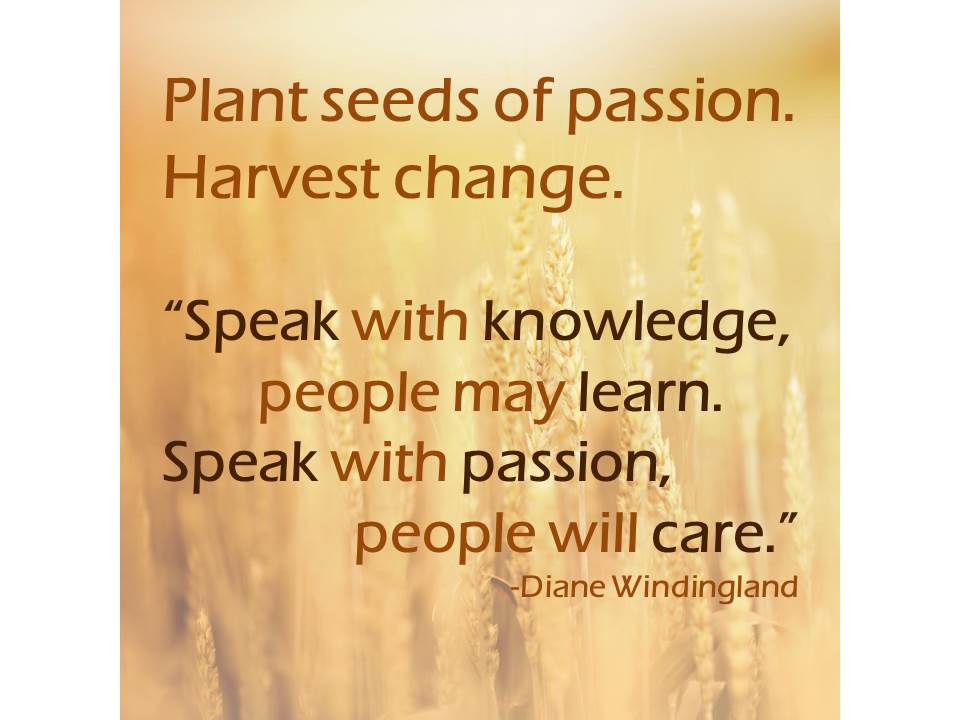Mr. Murdoch eyes shined when he talked about the periodic table of the elements.
Clearly, my high school chemistry teacher was passionate about chemistry, and even more passionate that his students understand the subject. Mr. Murdoch’s zeal for science was so contagious that I not only went on to take two more classes from him before I graduated from high school but I also decided to major in chemical engineering. That major only lasted a semester, but Mr. Murdoch’s passion for science inspired my life-long interest in the subject, and made me want to bring science to life when I homeschooled my children.
Mr. Murdoch didn’t just speak with knowledge, he spoke with passion. Most of his students actually cared about learning chemistry.
Speak with knowledge and people may learn.
Speak with passion and people will care.
And if you speak with passion, the clarity of your content will shine like a beacon, guiding your audience.
Content may be king with meeting planners, especially with a results-minded orientation. But, nobody wants dry, lifeless content. Nobody. Including you, I hope.
Now, you might have to deliver content that, on the surface, you are not so passionate about (for example, if your topic is prescribed), but there is a way to speak with passion even so.
When I first started out as a professional speaker, I gave high school classroom workshops for a local college, as a lead generator for the college. There were eight prescribed topics from budgeting to sexual harassment. They even had scripts for each of the presentations. I quickly learned, after memorizing the first 45-minute script, that in order to be passionate about a topic I had to do four things:
1. Drop the script. Sure, I had to cover the content points promised, but I could support that content with my own examples and stories, and by dropping the script, I could better engage.
2. Use relevant, personal stories. Stories connect with emotions. Passion is about emotion. For example, for the workshop presentation about budgeting, I was able to tell the story of my mother’s lack of planning and how she went from a beautiful, highly intelligent, highly educated woman to dying in poverty. I had pictures and props to make the story even more memorable.
3. Be authentic. Basically, this means to honestly expose who you are, minor warts and all. Nobody wants to feel that you have put yourself above them. I remember once when I spoke at an alternative high school. I looked up at a sea of young, tough, brown faces. I suspected they were forming judgments about me based on appearance, and brought it out into the open (appropriate for my talk on first impressions): “You might be looking at me, and thinking, ‘that dressed up, rich white woman doesn’t know my life.’ And you’re right, I don’t. But are you judging me too quickly? What if I told you that the clothes I’m wearing I bought at the Salvation Army . . .”
4. Care about the audience. It’s not enough to have passion for the topic. You have to have passion for your audience. If you don’t already have a passion for your audience, you probably need to find out more about them. Interview them, ask questions. What are their challenges as related to your topic. Become excited about how you might help them.
In his 2008 TED talk, “The Transformative Power of Classical Music,” conductor Benjamin Zander’s infectious passion for classical music illustrates the above concepts and so much more. It’s one of my favorite TED talks, and the only one I’ve watched more than once. Watch how he engages with the audience with his passion, humor and talent! Video
Plant seeds of passion. Harvest change.

